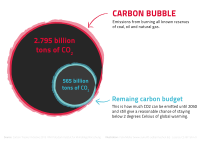
Photo from wikipedia
More than any other nations, the crude oil–exporting countries and especially the Organization of the Petroleum Exporting Countries (OPEC) are likely to experience a more difficult energy-transitioning regime because of… Click to show full abstract
More than any other nations, the crude oil–exporting countries and especially the Organization of the Petroleum Exporting Countries (OPEC) are likely to experience a more difficult energy-transitioning regime because of the economies’ high dependence on crude oil revenue. By using the Pooled Mean Group (PMG) Autoregressive Distributed Lag Models (ARDL) approach, this study examines the impact of the energy transition albeit from conventional to clean energy on carbon emissions in 11 members of the OPEC. While engaging the aforementioned objective, the study further examined the validity of the Environmental Kuznets Curve (EKC) hypothesis amidst urbanization drive among the countries. The result from the long-run estimates shows that fossil fuel utilization exerts a positively significant on environmental degradation in the selected countries, while the observed negative impact of renewable energy utilization and urbanization on carbon dioxide emission (CO2) was insignificant in both the short and long run. The implication is that the current energy transition policy of the OPEC states is not sufficient at driving the states’ environmental sustainability agenda. In addition, the EKC was not valid in the panel of the OPEC countries for the period of study, rather a U-shaped relation is established between income level and environmental degradation. Thus, this further posits that there is a setback in the push for environmental quality especially when there is an improvement in economic well-being through income growth in the OPEC states. Moreover, findings from the panel causality test show that there is no causality running from both fossil fuel and renewable energy consumption to the income level among the countries. On the contrary, a uni-directional causality was obtained from income level to renewable energy consumption, while urbanization strongly Granger causes fossil fuel use and CO2 emissions among the countries. As such, it is concluded that energy conservation policies can be implemented to reduce extreme dependence on fossil fuel use with little or no detrimental consequences, thus positioning the countries for economic prosperity in a sustainable environment.
Journal Title: Environmental Science and Pollution Research
Year Published: 2021
Link to full text (if available)
Share on Social Media: Sign Up to like & get
recommendations!